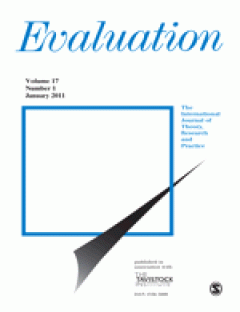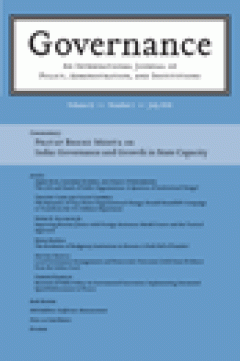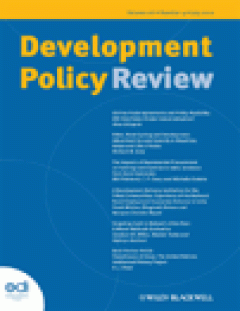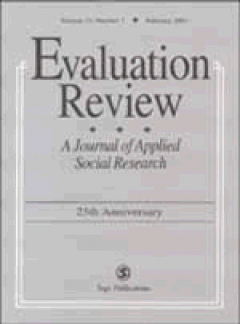Filter by

Sense and complexity : Initiatives in responsive performance audits
Many policy programmes yield disappointing results. Like policy evaluation, performance audit aims to help policy makers by uncovering barriers to success and suggesting improvements. Traditionally, performance audit relies heavily on policy objectives, norms, and criteria while focusing on the responsibility of a specific government entity (e.g. a ministry or an agency). More recently, however…
- Edition
- Vol. 17 no. 4, October 2011,pp. 351-363
- ISBN/ISSN
- 13563890
- Collation
- -
- Series Title
- Evaluation
- Call Number
- -

Deriving collaborative aims and outcomes : A case-study of cross-border coope…
This article draws on a study of cross-border cooperation in Central and Eastern Europe to examine the ways in which common aims are derived in collaborative ventures. It identifies that a lack of clarity can emerge as aims can be variously derived, belong to a single agency or be owned by individual actors. Aims may also be externally imposed by funding bodies. Aims can be explicit and thus op…
- Edition
- Vol. 17 no. 4, October 2011,pp. 365-382
- ISBN/ISSN
- 13563890
- Collation
- -
- Series Title
- Evaluation
- Call Number
- -

Using social network analysis to evaluate a complex policy network
There are many challenges in evaluating international networks within the fields of health and international development. Use of conventional tools is not only difficult but may fail to provide the kind of information that is developmentally useful. Social network analysis tools offer many benefits for network evaluators. In particular, they allow documentation and analysis of inter-relationshi…
- Edition
- Vol. 17 no. 4, October 2011,pp. 383-394
- ISBN/ISSN
- 13563890
- Collation
- -
- Series Title
- Evaluation
- Call Number
- -

The Limits of Policy Diffusion : Introducing International Norms of Anti-Mone…
This article examines the contribution of policy diffusion to create a regulatory system against money laundering in China. A two-level analysis of transnational interactions and domestic law making shows how Communist Party prerogatives shape the insertion of multilateral norms into the legal system. In a contentious process of local accommodation, transnationally engaged technocratic bodies, …
- Edition
- Volume 24, Issue 4, October 2011, pages 639–664
- ISBN/ISSN
- 09521895
- Collation
- -
- Series Title
- Governance
- Call Number
- -

Delegation and Institutional Design in Health-Care Rationing
The delegation of decision-making powers to nonmajoritarian, independent agencies has become a significant phenomenon in more and more policy areas. One of these is the health-care sector, where decisions on the range of services covered within public systems have, in most developed countries, been delegated to specialized bodies. This article offers an analytical framework that seeks to grasp …
- Edition
- Volume 24, Issue 4, October 2011, pages 665–688
- ISBN/ISSN
- 09521895
- Collation
- -
- Series Title
- Governance
- Call Number
- -

What Drives Reforms in International Organizations ? External Pressure and Bu…
This article explores organizational dynamics that go with the design and implementation of public administration reforms within the United Nations (UN) system. It focuses on management reforms carried out in the UNAIDS Programme, which brings together 10 UN agencies to combat the worldwide HIV/AIDS epidemic. The article suggests that understanding these reforms requires questioning the exposur…
- Edition
- Volume 24, Issue 4, October 2011, pages 689–712
- ISBN/ISSN
- 09521895
- Collation
- -
- Series Title
- Governance
- Call Number
- -

Explaining Variation in the Effectiveness of Transnational Energy Partnerships
This article analyzes the effectiveness of transnational multi-stakeholder partnerships for sustainable development�also known as �Type II outcomes� of the 2002 World Summit on Sustainable Development�in the sustainable energy sector. We combine quantitative and qualitative research. Quantitatively, we use a database of 340 partnerships, including 46 partnerships that focus on energy. Our quali…
- Edition
- Volume 24, Issue 4, October 2011, pages 713–736
- ISBN/ISSN
- 09521895
- Collation
- -
- Series Title
- Governance
- Call Number
- -

Getting Real About Food Prices
The 2008 spike in world grain prices is widely recognised to have had serious impacts on food security and poverty, but these high grain prices are commonly described as low in historical terms � an inconsistency resulting from the use of advanced- and global-economy price indices in calculating real prices. This ignores the high share of food in poor people's expenditures and the indirect effe…
- Edition
- Volume 29, Issue 6, November 2011, pages 647–664
- ISBN/ISSN
- 09506764
- Collation
- -
- Series Title
- Development Policy Review
- Call Number
- -

The Right Price of Food
Only a few years ago the widely shared view was that low food prices were a curse to developing countries and the poor. Their dramatic increase in 2006�8 appears to have altered this view fundamentally. High food prices are now judged to have a devastating effect on developing countries and the world's poor � a reversal of opinion that raises questions about the old and the new arguments and th…
- Edition
- Volume 29, Issue 6, November 2011, pages 667–688
- ISBN/ISSN
- 09506764
- Collation
- -
- Series Title
- Development Policy Review
- Call Number
- -

Impact of Public and Private Cash Transfers on Poverty and Inequality : Evide…
This article investigates the extent to which public and private transfers affected poverty and inequality in Vietnam in the mid-2000s. It finds that the impact of public transfers on poverty was negligible, due to the low coverage of the poor and the relatively small amounts transferred. Moreover, the effect of the receipt of transfers on expenditures was small: recipients decreased the labour…
- Edition
- Volume 29, Issue 6, November 2011, pages 689–728
- ISBN/ISSN
- 09506764
- Collation
- -
- Series Title
- Development Policy Review
- Call Number
- -

Agricultural Exports and Food Insecurity in Sub-Saharan Africa : A Qualititat…
Export of agricultural products is increasingly seen as one of the few viable instruments to solve the problem of food insecurity in developing countries. Using the configurative comparative method to study 17 countries in sub-Saharan Africa, this article argues that increasing agricultural export is only beneficial for certain types of developing countries. Before agricultural exports are enco…
- Edition
- Volume 29, Issue 6, November 2011, pages 729–748
- ISBN/ISSN
- 09506764
- Collation
- -
- Series Title
- Development Policy Review
- Call Number
- -

Newcomers to Like-Minded Aid and Donor Darlings : The Strange Case of Spain i…
This article analyses the motives behind the relations between Spain as a donor and Vietnam as a recipient of international aid. The main hypothesis is that this relationship does not respond to the traditional causes for international aid, as identified by the academic literature. On the basis of qualitative data collected in interviews with elites, the article suggests instead that a �learnin…
- Edition
- Volume 29, Issue 6, November 2011, pages 749–770
- ISBN/ISSN
- 09506764
- Collation
- -
- Series Title
- Development Policy Review
- Call Number
- -

Who votes in Africa? An examination of electoral participation in 10 African …
The question �Who votes in Africa?� has yet to receive significant attention. We use Afrobarometer survey data to assess the determinants of voting for over 17,000 voting-age adults in 10 African countries. We find that Africans are driven by many of the same forces as their counterparts elsewhere. The agencies of mobilization are important in determining who votes in these countries. Notably, …
- Edition
- Vol. 17 no. 6, November 2011,pp. 767-799
- ISBN/ISSN
- 13540688
- Collation
- -
- Series Title
- Party Politics
- Call Number
- -

Assimilation, contrast and voter projections of parties in left-right space :…
When voters place parties in their system along the left-right dimension, they often pull their preferred party closer towards them (assimilation) and push the opposition further away (contrast). This article asks a simple question: are such assimilation and contrast effects similarly powerful across different types of electoral system? I hypothesize that systems employing single-member distric…
- Edition
- Vol. 17 no. 6, November 2011.pp. 711-743
- ISBN/ISSN
- 13540688
- Collation
- -
- Series Title
- Party Politics
- Call Number
- -

Conceptualizing Left and Right in comparative politics : Towards a deductive …
Despite the importance of the Left-Right dimension in comparative politics, establishing an index that captures this dimension in both a theoretically and empirically sound manner remains an ongoing challenge for political scientists. Having reviewed existing attempts to construct measures for the Left-Right dimension, and having concluded that they are merely inductive and problematic from a m…
- Edition
- Vol. 17 no. 6. November 2011,pp. 745-765
- ISBN/ISSN
- 13540688
- Collation
- -
- Series Title
- Party Politics
- Call Number
- -

Doomed to disagree? Party-voter discipline and policy gridlock under divided …
This article explains the existence of policy gridlock in systems with divided government, even when there are policies that are universally preferred to the status quo. It is shown analytically that one dimension of party institutionalization (the degree of party-voter discipline) may create incentives for veto players to block policies that, ideologically, they might like. This is the case be…
- Edition
- Vol. 17 no. 6, November 2011,pp. 801-822
- ISBN/ISSN
- 13540688
- Collation
- -
- Series Title
- Party Politics
- Call Number
- -

Wedge-issue dynamics and party position shifts : Chinese exclusion debates in…
Even when the stakes of party-building are high, political parties often find their members divided over a key policy position. In post-Reconstruction America, the hot-button issue of excluding Chinese immigrant workers strengthened Democratic cohesion while splitting the �party of Lincoln�. Previous research has not completely investigated the role of party competition and cohesiveness in pavi…
- Edition
- Vol. 17 no. 6, November 2011,pp. 823-847
- ISBN/ISSN
- 13540688
- Collation
- -
- Series Title
- Party Politics
- Call Number
- -

Evidence-Based Versus Junk-Based Evaluation Research : Some Lessons From 35 Y…
- Edition
- Vol. 35 no. 3, June 2011.pp. 191-203
- ISBN/ISSN
- 0193841X
- Collation
- -
- Series Title
- Evaluation Review
- Call Number
- -
- Edition
- Vol. 35 no. 3, June 2011.pp. 191-203
- ISBN/ISSN
- 0193841X
- Collation
- -
- Series Title
- Evaluation Review
- Call Number
- -

Conventional and Piecewise Growth Modeling Techniques : Applications and Impl…
This article reviews the mechanics of conventional and piecewise growth models to demonstrate the unique affordances of each technique for examining the nature and predictors of children�s early literacy learning during the transition from preschool through first grade. Using the nationally representative Family and Child Experiences Survey (FACES) data set, 1997 cohort, the authors show how pi…
- Edition
- Vol. 35 no. 3, June 2011,pp. 204-239
- ISBN/ISSN
- 0193841X
- Collation
- -
- Series Title
- Evaluation Review
- Call Number
- -

Testing Mediation Using Multiple Regression and Structural Equation Modeling …
Mediation analysis in child and adolescent development research is possible using large secondary data sets. This article provides an overview of two statistical methods commonly used to test mediated effects in secondary analysis: multiple regression and structural equation modeling (SEM). Two empirical studies are presented to illustrate the respective circumstances in which the two methods a…
- Edition
- Vol. 35 no. 3, June 2011,pp. 240-268
- ISBN/ISSN
- 0193841X
- Collation
- -
- Series Title
- Evaluation Review
- Call Number
- -
 Computer Science, Information & General Works
Computer Science, Information & General Works  Philosophy & Psychology
Philosophy & Psychology  Religion
Religion  Social Sciences
Social Sciences  Language
Language  Pure Science
Pure Science  Applied Sciences
Applied Sciences  Art & Recreation
Art & Recreation  Literature
Literature  History & Geography
History & Geography